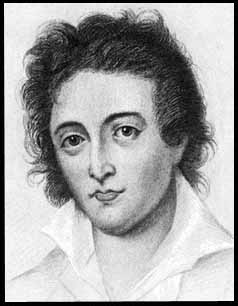Percy Bysshe Shelley
1792-1822
Percy Bysshe Shelley

Mesdames, one might believe that Shelley lies
Less in the stars than in their earthly wake,
Since the radiant disclosures that you make
Are of an eternal vista, manqué and gold
And brown, an Italy of the mind, a place
Of fear before the disorder of the strange,
A time in which the poet's politics
Will rule in a poets' world.
Wallace Stevens
|
What I would not give to be present with Lord Byron, Percy Shelley and his wife Mary on the shores of Lake Geneva in that summer of . This, in my opinion, represents an unusual convergent of literary talents
Shelley, the possibility and power of the imaginiation
real life - not that he is ignorant or unconcerned with the political reality of the Europe of his time - quite the contrary!- but that he was almost entirely removed from it in practice.
Writing away desperately in protest of the status quo to a continent that payed no attention to him or his politics. In retrospect, the Europe of Metternich was to lose the struggle with ascendent liberalism as the revolutions of America and France (relatively freer) began the democratic era, an occurrence that Shelley presaged and would have appreciated greatly. However, even today almost 200 years later in a more politically "enlightened" time Shelley seems just as idealistic - and relevant - to us today. Cant, cruelty, and arrogance in political power are still much in evidence today and the type of idealized world Shelley sought seems just as out of reach today as in his time, in my opinion. Moreover, I doubt the human situation will drastically change in time in the near future - man the animal, in all his cruelty and goodness.
I have always empathized with Geroge Santayana and his following observation about Shelley:
Shelley was one of those spokesmen for the a priori, one of those nurslings of the womb, like a bee or a butterfly; a dogmatic, inspired, perfect and incorrigible creature...
Being a finished child of nature, not a joint product like most of us, of history, nature, and society, he abounded miraculously in his own clear sense but was obtuse to the droll, miscellaneous lessons of fortune. The cannonade of hard, inexplicable facts that knocks into most of us what little wisdom we have, left Shelley dazed and sore, perhaps, but uninstructed. When the storm was over he began chirping again in his own natural note.
If the world continuted to confine and oppress him, he hated the world, and gasped for freedom. Being incapable of understanding reality, he revelled in creating world after world of idea.
I completely agree. Once more: it is not that Shelley was a visionary ignorant of the real world but that he psychologically did not move on the same plane as men of power and responsibility. In fact, one could define Percy Shelley as totally opposed to such men by nature.
is still in plentiful
perfection,
the inevitable large difference between the most sweet sounding political theory and it's praxis. In my opinion, Shelley - for all his political acitivism - has no place in the world of politics because politcs is the art of the possible, not the impossible; and if mankind is not to become in the future something very different than he is now Shelley will remain in his own antiseptic intellectual realm.
If Shelley is the hope of freedom and liberty in literature, then Dostoyevsky's "The Grand Inquisitor" is all too often the reality.
messiness of his home life - responsibility
living with imperfection and fallen people and peoples
living with it and making the best
resignation and wisdom, blind to all that, which is his best and worst quality at the same time. A politcal and spiritual prophet whose personal life and affairs were constantly a mess. Especially in his romantic life, Shelley left devastation in his wake. It is one thing to be constantly falling in love, another to be in love with the same person over a lifetime and make the relationship work.
Shelley is an artist par excellence - a poet's poet - and an utterly impractical man - can you imagine Shelley actually leading a political or military campaign? Getting things done in the world of men? Greek example, Byron actually dieng there. It should surprise no one that Shelley finally died by drowning.
I will never look upon Shelley and his poetry without a sense of sadness, knowing it to be impossible. Still, I cannot but help but read his "In Defense of Poetry" without catching some of his idealism and wondering how much better off we would be in this world if poets a la Shelley were our legislators:
In Defense of Poetry
The poetry of Percey Shelley to me - despite all his shortcomings - is along with Shakespeare's Love Sonnets and Mozart's best music, some of the happiest moments of mankind.

 Back to Heroes Page
Back to Heroes Page


 Back to Heroes Page
Back to Heroes Page